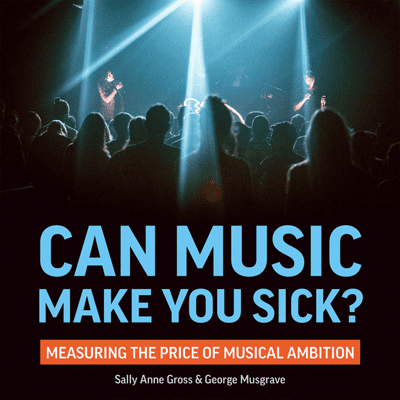
Can Music Make You Sick? Measuring the Price of Musical Ambition– Sally Anne Gross & George Musgrave
Podcast af University of Westminster Press
Begrænset tilbud
2 måneder kun 1,00 kr.
Derefter 99,00 kr. / månedIngen binding.

Mere end 1 million lyttere
Du vil elske Podimo, og du er ikke alene
Rated 4.7 in the App Store
Læs mere Can Music Make You Sick? Measuring the Price of Musical Ambition– Sally Anne Gross & George Musgrave
An invaluable guide for those currently making their career in music. By listening to how musicians think and feel about their working lives, this book shows that if making music is therapeutic, making a career from it can be traumatic. It shows how careers based on passion have become more insecure and devalued, artistic merit and intimate self-disclosures are the focus of unremitting scrutiny, & personal relationships and social networks are bound up with calculative transactions. Going beyond self-help strategies, the authors challenge the industry to make transformative structural change.
Alle episoder
6 episoderTwo main research questions at the heart of the study are revisited: how widespread are mental health conditions (anxiety and depression specifically) amongst music workers? How do musicians feel about the work they do and the impact it has on their emotional wellbeing? It is just suggested that the three ‘statuses’ which the book identifies correspond to ideas of economic (the status of work), cultural (the status of value) and social (the status of relationships) validation, that offer a framework for understanding and answering these questions. The chapter suggests that the working lives of musicians today are different to those of the past given the huge levels of competition and the injunction to participate and create ‘content’, embedded as they are in wider infrastructures of technology companies which care little for their art or musicians’ wellbeing. The chapter concludes by considering what options might exist to improve the situation, by exploring listening and the role of therapy, the role of public policy, and a discussion around the idea of a legal ‘duty of care’ in the music professions. Finally, there is an extended discussion of the implications of the author’s findings for the role of music education for the profession moving forward. The text concludes with a final question: what does this research tell us about the price of working in music for those who follow it as a career, and is the price of such musical ambition just too high?
By exploring the convergence and distortions of private and public space brought about by social media, this chapter explains how these have served to amplify the impacts of having musical ambition. Such tensions resulting present specific challenges to all social relations, especially family and close personal relationships. Tensions between musicians and those closest to them – their friends, partners and family – further extend out into musical communities against a background of intensified competition and existing inequalities. Ultimately, it is proposed that economic relationships are personal and social relationships, and there is an impact this comes to have on musicians. The ‘fantasy of participation’ conflated with the myth of meritocracy that is so central to a musical ambition has a visibly polarising and insidious impact, especially on female musicians working in the UK music industries, which the final section explores. The chapter emphasises the psychic and affective dimension of ‘the status of relationships’ in order to better understand the particularly high levels of anxiety and depression reported by female respondents to the authors’ earlier survey.
Having considered the destabilising questions of what musical work is, what it means, and the nature of ‘success’, this chapter examines the ways in which musicians seek answers to those questions. Navigating this landscape, musicians turn to other forms of reference. This the authors term: ‘The Status of Value’. This evaluation takes place in two key ways: firstly, online, and secondly in the reified and ill-defined music industries. Firstly, the chapter looks at how musicians’ relationship to technology – in the form of the online sharing and the consumption of their work – creates an environment of perpetual anxiety. This takes place as the emotional vulnerability inherent in receiving feedback for creative work intersects with an injunction to participate in an exhausting quest to maintain relevancy. Subsequently the authors examine how musicians engage with processes of value measurement offline, within the music industry itself. Ideas of luck, randomness and timing are understood as playing a key role in the careers of musicians, and these ‘unknowns’ produce high levels of emotional distress and anxiety. The chapter concludes by exploring one of the most profound anxiety-producing tensions in professional musicians’ lives, where the precarious and unpredictable workplace comes up against entrepreneurial ideals of control. The authors conclude that contemporary notions of artistic empowerment in the digital age are dangerous, as they reinforce an idea of individualised entrepreneurial control which is largely illusory.
‘The Status of Work’ explores how musicians today attempt to make sense of the musical ‘work’ they do, asking themselves challenging questions about value, self-worth, and the role music might come to play in their future lives. The chapter begins by outlining the multitude of roles and activities musicians undertake on a daily basis. It follows with a discussion of how these music makers struggle to both define their working practices as labour and establish – or even be able to feel – that their work is a ‘success’. This chapter outlines three main points. Firstly, the work that musicians do is far more than just the practice of music making. Forging a career in creative production is all-consuming, involving the musicians’ time, personality and identity. Secondly, musicians struggle to meaningfully define what success is. This all takes place in a setting in which representations both of self and of others are highly visible and contested. Lastly musicians are anxious about the role their work might come to play in their futures struggling to reconcile industry myths of meritocracy and success against a reality where such successes are ‘always’ just around the corner. The authors ask: what does it feel like to do this work; for musicians to embody this work? What does it feel like to work so hard at something which you or others might not even consider work and which produces outcomes so hard to make sense of and which often contradict each other?
‘Sanity, Madness and Music’ discusses persistent tropes about artistic creativity in the context of an emerging ‘new language of mental health’ when discussing wellbeing and the mental health of musicians. Drawing on the work of David Smail the authors argue that external interests have been noticeably absent or overlooked in the development of thought around psychology and the creative individual, and that people’s subjective understand of their relative mental states is crucial in an environment where the terms ‘wellbeing’ and ‘mental health’ both suffer from terminological and definitional ambiguity. This conceptualisation leads to the second part of this chapter outlining the methodological approach adopted in the author’s research. After outlining the quantitative findings of a large survey of 2,211 musical workers, the chapter concludes by outlining why it was so crucial to go on to undertake a qualitative study and hear from musicians themselves, in their own words, about how they were experiencing their creative lives, and their subjective perception of how this impacts on their mental health and wellbeing.

Rated 4.7 in the App Store
Begrænset tilbud
2 måneder kun 1,00 kr.
Derefter 99,00 kr. / månedIngen binding.
Eksklusive podcasts
Uden reklamer
Gratis podcasts
Lydbøger
20 timer / måned

































